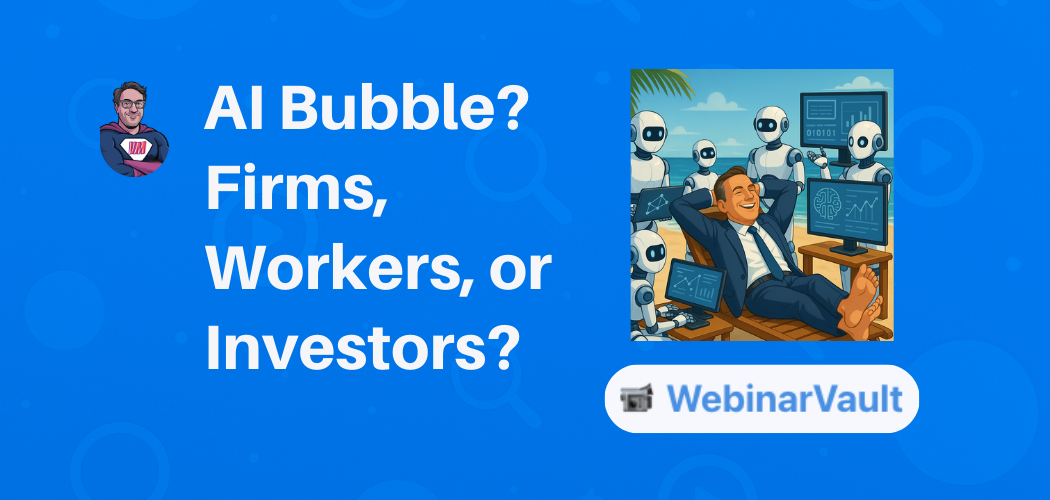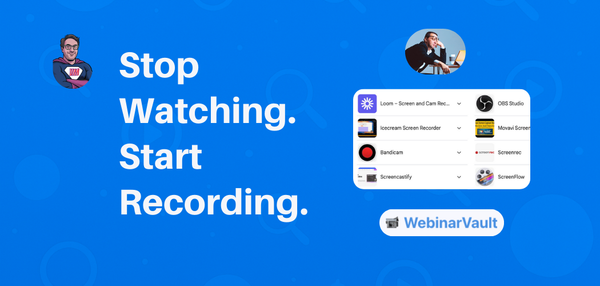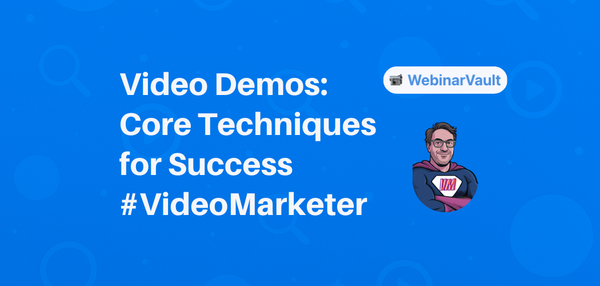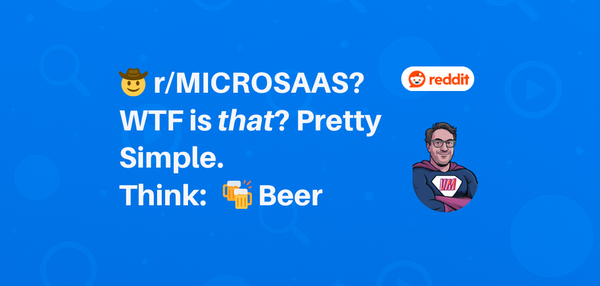Will an AI Bubble Benefit Employees Over Enterprises?

I'm shocked this question has even crossed my mind:
Will an AI bubble—if there indeed is one—benefit employees over enterprises?
There's a lot to unpack. I'm Brian Ring, Founder & CEO of WebinarVault, a micro-SaaS platform that empowers ambitious, LLM-forward product marketers and go-to-market pros with a huge time-saver. [Get a free, no credit card required trial.]
As I build out this insanely-useful wrapper on top of LLMs like Claude, Perplexity, Llama, and OpenAI, I've increasingly wondered if competition in generative AI will make this tech revolution unlike all others.
Specifically, could it up-end the power law market dynamics that have defined the rise of Big Tech?
Winner Take All?
For nearly three decades, we've watched big tech gradually swallow up our world.
In sector after sector, every winner was a mega-winner. Each revolution achieved ever-greater scale at a quicker pace, with the power law prevailing.
The internet explodes. It produces King Google. Steve Jobs invents the iPhone, and Apple races past a trillion in market cap. Social media alters brains and Zuck's standing tall. Winner take all. Cloud computing explodes? Jeff Bezos shows us what a real second act looks like. Streaming? Netflix dominates.
All the while, individual employees—even, or especially, the digitally savvy—get pushed further down a labor market tunnel characterized by galactic-scale big tech monopolies that essentially de-leverage human workers by pushing them into ever-similar collaborative, constrained digital ecosystems.
Don't get me wrong—it's for good reason and to great effect! Efficiency, economics, innovation: we can't deny the magical advancements and efficiency benefits being created before our eyes in industry after industry.
But in this world of increasing economic scale and concentration, the typical supply and demand math for labor may eventually break down.
That course looks like this:
New technologies arise, some workers are displaced, another set of jobs emerges. The folks leaning into the new tech benefit from it—for some short period of time.
Then, through the cycle, the technology gets adopted, scales up, and gets further refined and structured into enterprises and commercial workflows.
Over time, a winner emerges in each category, and after a few cycles, the productivity-boosting benefits eventually penetrate everywhere.
Jobs are lost. New jobs are created in new areas. But in the past few decades, those jobs have increasingly been lower-value jobs. Labor's value declines.
Will That History Repeat with Generative AI?
The wealthiest enterprises seem to think so. Meta, Microsoft, Google—their capital spending on training and running Generative Predictive Transformer models with human reinforcement learning is already enormous. These massively capitalized players appear desperate not to be left behind.
Today there are at least seven globally scaled, hugely successful firms with frontier models that are pretty darn good.
To wit, venture capitalist investors also think this is a must-win game. It's 1999 all over again. "LLMs are a once-in-a-lifetime technology shift," they say.
The commercial evidence for AI's utility? Explosive sales and annual recurring revenue rates. As of July 2024, ChatGPT is projected to sell $12B worth of subscription revenue delivering responses this year. At a projected cost of $20B.
It's the most well-known LLM, but many others are driving similar growth. Stories of companies like Lovable, Cursor, and Windsurf driving 25x growth rates (like, going from $4M to $100M in 12 months) are starting to sound like a pattern.
Game Not Over
Conventional wisdom says there'll be a single winner, or at most a few winners.
So it's OpenAI's game to lose, right?
Well, Sam Altman appears to be trying. The ChatGPT-5 rollout was a disaster. Worse still, in some LLM evaluation metric leaderboards, ChatGPT is in third place.
Then there's Grok. Love him or hate him, Elon Musk's LLM sits at the top of the LLM evaluation leaderboards I just looked at. I was surprised!
Google's Gemini is at number two. But I must say, it has that sleeping giant sense about it, and its latest entry on the voice AI front is exceptionally cool. (It can do real-time translation and vocalization—AI dubbing.) Strong.
In fourth place is Claude from Anthropic. Another shock for me. I love Claude. We're so, well, in-sync!
Meta's Llama, DeepSeek, and Alibaba Qwen round out the list of seven well-capitalized platforms competing in this market and not giving up anytime soon.
On top of this rich ecosystem of amazing models, there is rising acceptance that cross-platform protocols like MCP will mature and extend enterprise solutions and multi-model workflows well into the developer community.
That's a lot of great models to assume that only one is going to win.
Especially when you realize they are already so malleable, customizable, and tunable. The context and prompting window is our opportunity to get exactly what we need out of them.
And by "we," I think I mean mostly me. Or you. Individually.
Can Enterprises Fully Reap AI's Benefits?
What if value extraction from LLMs is just too delicate, intricate, and, well, human to be fully mined by companies? Could that happen? Maybe.
For one thing, the pace of innovation is just so damn fast.
You can't afford to get locked into a standard model when a neighboring model gets a step-change benefit. That becomes a serious corporate risk.
In one weekend, we at WebinarVault deployed Llama. (It did not perform well.)
Another weekend, we deployed ChatGPT 4.1.
Its context window was ten times the previous model's.
Suddenly we could process an 8-hour transcript versus a 1-hour transcript the Friday before.
TwelveLabs, a company that raised $50M from Nvidia, can't match WebinarVault's context window. Imagine that! I've invested fractions of pennies on their millions. 👊
When you increase the context window by an order of magnitude, you make the unimaginable possible.
If you're a competing model that wasn't focused on context window size, that product release could really hamper your competitiveness.
Imagine it like this.
Imagine you're at a hockey game, you glance up at the scoreboard, and just as you do, the rules of the game change to water polo, the ice completely melts, and the Canadians are taking off their gloves, pads, jerseys, and skates. That's my surreal example of how game-changing it could be to not have the latest model of the month. Here's a generated video example of what that looks like, generated by Kling.ai 🤽Kling Ai Hockey to Water Polo - Watch Video
In that world, won't employees bypass official models and create a new shadow IT problem? Or, perhaps more likely, employees won't, and enterprises will suffer because they won't be able to adopt the LLM revolution to benefit their bottom line.
What if the real skill is in how creatively humans interact with AI? What if we all ned to be managers and orchestrators, prompting, chaining, and no code workflow designing?
If models are partially differentiated over time, which I believe is likely, we may end up somewhere in the middle.
But building secure, standardized, perfect AI workflows, one-by-one, with "forward deployed engineers" as the new lingo has it - well that may prove to be way too expensive, slow, or both.
Landing This Plane: The AI Revolution Is the Most Democratizing of All
Finally, let's revisit OpenAI's revenue.
Where is that coming from? Seventy-five percent comes directly from consumers. Only 5-6% of users pay for the service, but it's a majority of their revenue.
Enterprise & API revenue makes up 25%.
But let's think about that again. Are they consumers? Or are they people—workers, employees—who are exploiting these advances for themselves, personally, as they interact with their daily lives, including with the people they work with?
Maybe generative AI is just different enough, just human enough, that maybe this bubble will lift up employees and freelancers and actually hit enterprises and investors in surprising ways. Maybe big tech is about to compete away profits and we'll arrive at a new place where people - and their agenrts - are actually corporations.
I feel like I've an army of brilliant PhDs and interns around me. This tech revolution could be the most democratizing of them all.
Has Big Tech finally built its Frankenstein?
I want to know what you think. Please comment, like, subscribe! 🙏





